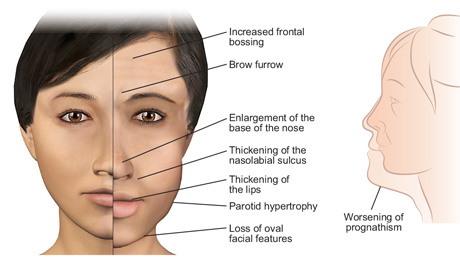Acromegaly Causes, Symptoms, Diagnosis and Treatment

What Is Acromegaly?
Acromegaly is an extremely rare syndrome that results when the anterior pituitary gland produces excess growth hormone (GH) after epiphyseal plate closure at puberty.
Because of its pathogenesis and slow progression, it is hard to diagnose in the early stages and is frequently missed for years until changes in external features, especially of the face, become noticeable.
If not treated promptly, acromegaly can lead to serious illness and even become life-threatening.
Causes Of Acromegaly:
Acromegaly is caused by:
- Pituitary adenoma
- Non-pituitary tumors
Acromegaly can lead to the following complications:
- Severe headache
- Arthritis and carpal tunnel syndrome
- Enlarged heart
- Hypertension
- Diabetes mellitus (excess of GH leads to insulin resistance)
- Heart failure
- Kidney failure
- Colorectal cancer
- Compression of the optic chiasm leading to loss of vision in the outer visual fields
Symptoms Of Acromegaly:
Acromegaly is characterized by the following symptoms:
- Soft tissue swelling visibly resulting in enlargement of the hands, feet, nose, lips and ears, and a general thickening of the skin
- Soft tissue swelling of internal organs, notably the heart with attendant weakening of its muscularity, and the kidneys, also the vocal cords resulting in a characteristic thick, deep voice and slowing of speech
- Generalized expansion of the skull at the fontanelle
- Pronounced brow protrusion, often with ocular distension (frontal bossing)
- Pronounced lower jaw protrusion (prognathism) with attendant macroglossia (enlargement of the tongue) and teeth spacing
- Hypertrichosis, hyperpigmentation and hyperhidrosis may occur in these patients.
- Acrochordon (skin tags)
- Coarsened, enlarged facial features
- Coarse, oily, thickened skin
- Excessive sweating and body odor
- Fatigue and muscle weakness
- Severe snoring due to obstruction of the upper airway
- Impaired vision
- Enlarged tongue
- Pain and limited joint mobility
- Menstrual cycle irregularities in women
- Erectile dysfunction in men
- Enlarged liver, heart, kidneys, spleen and other organs
- Increased chest size (barrel chest)
Diagnosis Of Acromegaly:
After taking a medical history and conducting a physical exam, the doctor may follow the mentioned steps:
- GH and IGF-I measurement.
- Fasting overnight
- Taking a blood sample to measure levels of GH
- Elevated levels of GH suggest acromegaly
- Growth hormone suppression test.
- Measuring blood levels of GH before and after drinking a preparation of glucose
- High GH level after consumption diagnoses acromegaly
- Imaging.
- MRI
Treatment Of Acromegaly:
The following treatment options are available:
- Surgery
- Medication
- Somatostatin analogues.
- Dopamine agonists.
- Growth hormone antagonist.
- Radiation
- Conventional radiation therapy.
- Stereotactic radiosurgery.
By : Natural Health News




